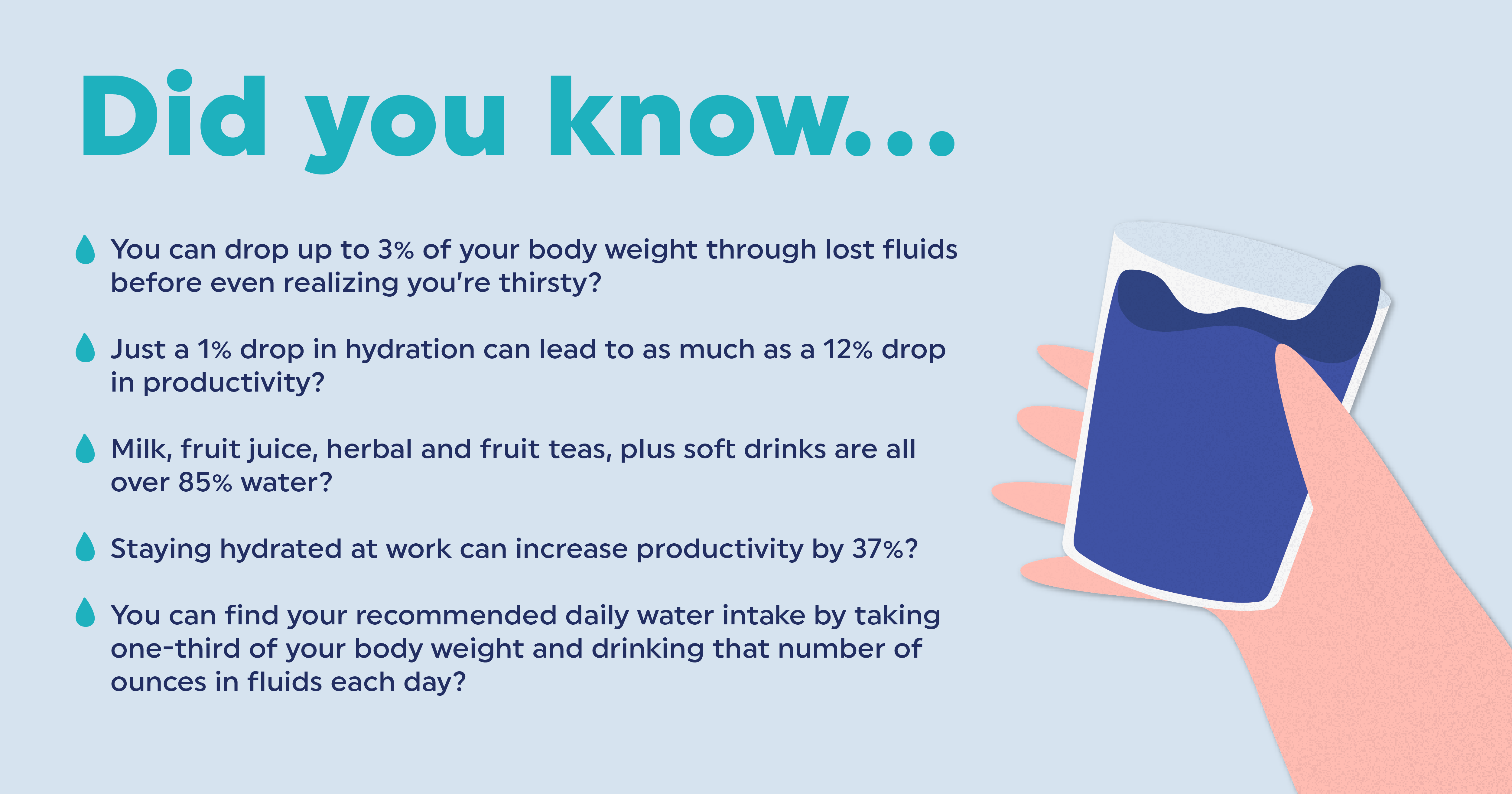 It’s crucial to fuel your body, not only with healthy snacks but also with water and other drinks. But between providing patient care and assisting fellow medical professionals, it can be tough to carve out water breaks throughout your shift, no matter if you’re working an 8 A.M. to 5 P.M. or a 12-hour nursing shift. So, we created these tips for staying hydrated at work, made specifically for travel nurses and allied health travelers like you!
It’s crucial to fuel your body, not only with healthy snacks but also with water and other drinks. But between providing patient care and assisting fellow medical professionals, it can be tough to carve out water breaks throughout your shift, no matter if you’re working an 8 A.M. to 5 P.M. or a 12-hour nursing shift. So, we created these tips for staying hydrated at work, made specifically for travel nurses and allied health travelers like you!
- Why is it important to stay hydrated?
- Signs of dehydration
- Healthcare traveler tips for staying hydrated at work
- ✨BONUS ✨Frequently asked questions (FAQs)
Staying Hydrated at Work: Tips for Healthcare Travelers
Why is it important to stay hydrated?
When you’re working as hard and as much as you do, staying hydrated is vital to your overall health and well-being. Not only does drinking water at work help keep you alert and focused, but it also prevents dehydration-related health issues like headaches, dizziness, fatigue, and impaired cognitive function. By prioritizing hydration safety and taking regular breaks to drink water throughout the workday, you can operate at peak performance and provide the highest levels of care possible to your patients.
Hydration and physical health
Ever notice how your body feels when it’s properly hydrated? Feels pretty good! That’s because water is essential for almost every bodily function, including regulating body temperature, transporting nutrients and oxygen to cells, and flushing out toxins. When you’re dehydrated, your body’s unable to perform these functions, which can cause muscle cramps, constipation, and even kidney stones.
Drinking enough water has been linked to numerous health benefits like reducing the risk of heart disease, regulating blood pressure, and improving skin health. Treat yourself on a new level and make sure you stay hydrated at work.
Hydration and mental health
Since about 60% of your body is water, it makes sense that staying hydrated would benefit your physical health. But did you know that drinking water at work does numerous favors for your mental health, as well?
Studies have shown that even mild dehydration can negatively impact cognitive function, including the ability to process information and make decisions. When experiencing dehydration, feelings of anxiety, irritability, and depression may follow. To keep your mind functioning at its strongest, drink water at work.
Hydration fun facts

Signs of dehydration
How do you know if you’re dehydrated? Dehydration occurs when you use or lose more fluid than you take in. If you experience excessive thirst, dry mouth, fatigue, lightheadedness, headaches, an inability to focus, or dark yellow or amber-colored urine, it may be a sign that you may need to up your water intake. Here’s what you can do to avoid the uncomfortable symptoms of dehydration: hydrate, hydrate, hydrate!
Healthcare traveler tips for staying hydrated at work
In need of some quick hydration tips? You’re in the right place. These are the best ways to get hydrated so you can effortlessly glide through your shift.
1. Start your day with a glass of water (and continue hydrating throughout the day)
Ever wake up with a hankering for a refreshing glass of water? Drinking water first thing in the morning is a healthy habit that can make or break the day ahead of you.
“We often get dehydrated overnight,” said nutritionist Kimberly Snyder. “Hydrating in the morning will give you more energy and set you up for a day of success.”
Drinking water immediately after waking up can help rehydrate and revitalize your body and mind. Studies have shown that a glass of water in the morning can improve cognitive function, increase energy levels, and promote healthy skin. Plus, drinking water on an empty stomach can help flush out toxins, aid digestion, and boost your metabolism.
Not only should you start your day with a cup of H2O, but you should also continue to hydrate throughout the entirety of the day.
“The body uses and loses water daily, so it’s essential to replace water throughout the day,” said Sherri Hoyt, registered dietitian nutritionist. “Water is lost during normal bodily processes. Aim to hydrate regularly throughout the day instead of all at one time or playing catch-up at the end of the day.”
Making time for water breaks throughout a hectic workday can be tough. But you know what makes it easier? Having your very own handy dandy work water bottle.
2. Invest in a reusable water bottle to bring to work
It can be a challenge to stay hydrated, especially as a busy healthcare professional. If you’re concerned that you’re not getting enough water throughout the day, try bringing a reusable water bottle to work with you!
“It helps remind you to drink water while you’re out and about for the day,” Snyder said. “I’m all for visual and physical cues like water bottles you see that remind you to drink up!”
With a water bottle in hand, it’s easy to stay hydrated while on the go, whether you’re running to and from patient rooms or simply taking time to step away for a quick stretching break. With a travel water bottle, you can sip on fluids throughout your shift, rather than trying to cram in a large amount all at once. Power through even the longest and most grueling shifts and give this hydration hot tip a try!
There are hundreds of travel bottle options out there. Not sure which is the right one for you? Check out the best water bottles for nurses and allied health professionals.
- Takeya Actives Insulated Water Bottle with Spout Lid (22 oz)
- CamelBak eddy+ BPA-Free Water Bottle (25 oz)
- Hydro Flask Standard Mouth (21 oz)
- Thermos Hydration Bottle (24 oz)
3. Track water intake
Did you know that tracking how much water you drink in a day can be an effective way to ensure you stay hydrated at work? By monitoring how much water you drink each day, you can gain a better understanding of your hydration levels and adjust your intake as needed.
The best part is there are several easy ways to track fluid intake. One of the most common (and easiest) ways is to use a water bottle with volume markings, which allow you to measure how much water you’re consuming throughout the day.
Another popular way to track water intake is through a mobile app or fitness tracker. In addition to monitoring how much water you drink, these tools can also provide a water break reminder.
With so many app options, it can be hard to narrow down which one to download. Pro tip: start by focusing on the best free water-tracking apps like Waterllama, Hydro Coach, and Plant Nanny. Test them out and decide which water tracker app best fits your needs.
4. Snack on hydrating foods throughout the day
Although drinking water is one of the best ways to hydrate, eating water-rich snacks and avoiding salty foods can also curb feelings of dehydration. Consuming snacks like watermelon, cucumbers, and strawberries, which are full of water and essential vitamins, can help replenish your body’s water levels.
“According to the recommendations, about 20% of daily fluid intake can come from foods,” said Wendy Bazilian, a registered doctor of public health and nutritionist. “Think primarily water-rich vegetables and fruit, but also other foods and types of meals that are water-rich. Tea, coffee, milk, and other beverages count, too.”
As an added bonus, these foods can help reduce cravings, increase energy, and keep you full for longer. That way, you can get a much-needed pick-me-up without interrupting your whole day. Take your hydration game to the next level and quench your thirst with a tasty, water-rich treat.
Frequently asked questions
How can I stay hydrated without drinking water?
Luckily there are other ways to hydrate when you’re thirsty but water’s not an appealing beverage option. If you find yourself in this situation, try low-sugar coconut water, sports drinks, sparkling water, or add flavor to filtered water.
How much water should I drink to avoid dehydration?
Staying hydrated is the key to maintaining optimal health and avoiding dehydration. But how much water should you drink exactly? That depends on your gender, age, physical activity, and climate of where you’re working a travel nursing job or allied health travel job.
As a general rule, the National Academy of Medicine recommends 3.7 liters of fluids for men per day and 2.7 liters for women. However, each person’s individual needs may vary, so if you want a more accurate estimate, take one-third of your body weight and drink that amount of water in ounces. For example, if you weigh 150 pounds, aim to drink about 50 ounces of water a day.
How long does it take to properly hydrate?
Typically, it takes your body around 15 minutes to absorb the fluid after drinking a glass of water. But when you experience dehydration, even mild dehydration, it can take up to three times as long. While it depends on how dehydrated you are, it usually takes approximately two hours for your body to fully rehydrate.
To maintain proper hydration, it’s important to continue to drink water all day long. To make sure you’re the right amount of hydrated, listen and pay attention to your body’s signals.
Does drinking water make you happier?
It’s no secret that hydration and mental health are closely linked. But did you know that drinking water can improve your overall mood? According to research published in the Journal of Nutrition, a 1-2% water deficit can cause you to fall into a foul mood and increase your chances of experiencing headaches and fatigue. Additionally, drinking water releases endorphins, aka the happy hormone, and can give you a natural mood boost.
Want to feel like your best self? Set some hydration goals throughout the day! Drinking plenty and staying hydrated on the job will keep you alert, energized, and focused throughout a long healthcare shift, allowing you to provide the highest quality care to your patients.





